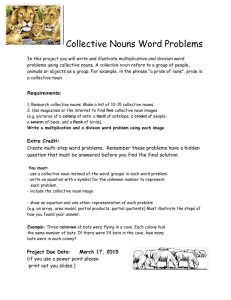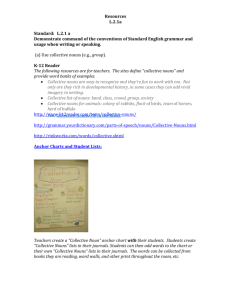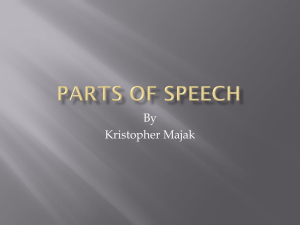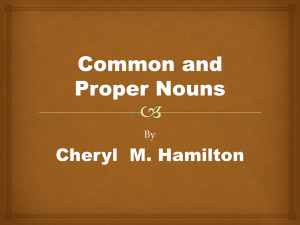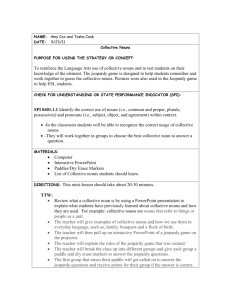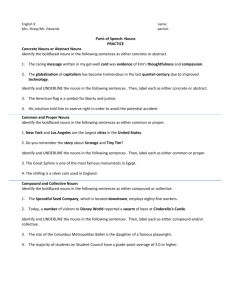Teacher recollections - Warialda Public School
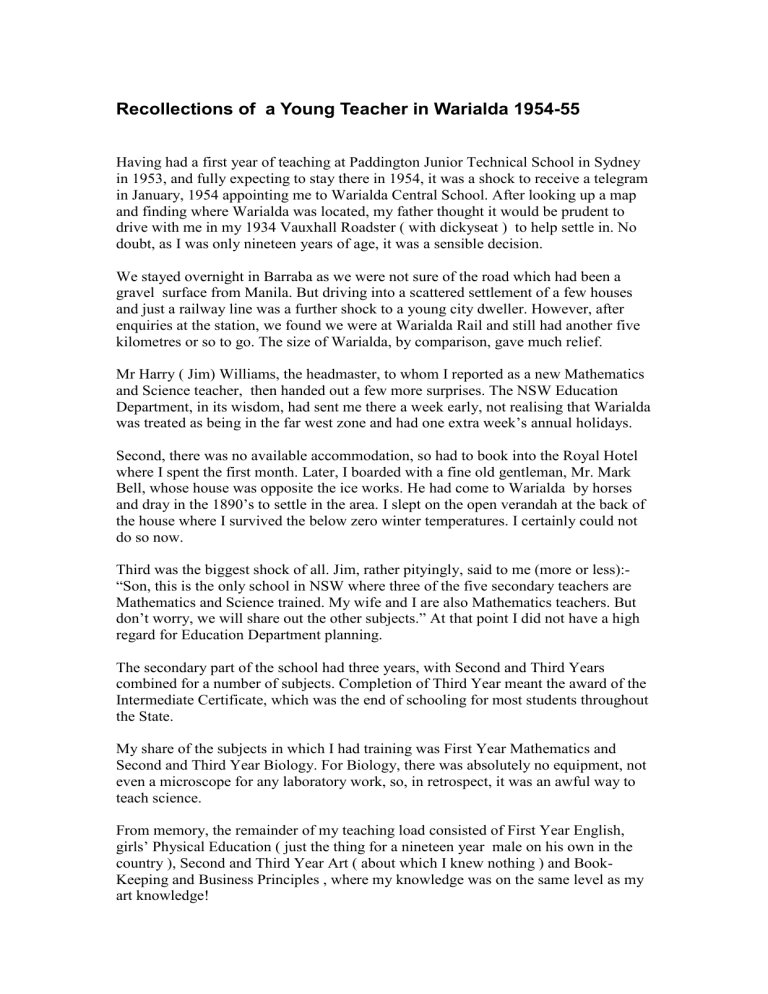
Recollections of a Young Teacher in Warialda 1954-55
Having had a first year of teaching at Paddington Junior Technical School in Sydney in 1953, and fully expecting to stay there in 1954, it was a shock to receive a telegram in January, 1954 appointing me to Warialda Central School. After looking up a map and finding where Warialda was located, my father thought it would be prudent to drive with me in my 1934 Vauxhall Roadster ( with dickyseat ) to help settle in. No doubt, as I was only nineteen years of age, it was a sensible decision.
We stayed overnight in Barraba as we were not sure of the road which had been a gravel surface from Manila. But driving into a scattered settlement of a few houses and just a railway line was a further shock to a young city dweller. However, after enquiries at the station, we found we were at Warialda Rail and still had another five kilometres or so to go. The size of Warialda, by comparison, gave much relief.
Mr Harry ( Jim) Williams, the headmaster, to whom I reported as a new Mathematics and Science teacher, then handed out a few more surprises. The NSW Education
Department, in its wisdom, had sent me there a week early, not realising that Warialda was treated as being in the far west zone and had one extra week’s annual holidays.
Second, there was no available accommodation, so had to book into the Royal Hotel where I spent the first month. Later, I boarded with a fine old gentleman, Mr. Mark
Bell, whose house was opposite the ice works. He had come to Warialda by horses and dray in the 1890’s to settle in the area. I slept on the open verandah at the back of the house where I survived the below zero winter temperatures. I certainly could not do so now.
Third was the biggest shock of all. Jim, rather pityingly, said to me (more or less):-
“Son, this is the only school in NSW where three of the five secondary teachers are
Mathematics and Science trained. My wife and I are also Mathematics teachers. But don’t worry, we will share out the other subjects.” At that point I did not have a high regard for Education Department planning.
The secondary part of the school had three years, with Second and Third Years combined for a number of subjects. Completion of Third Year meant the award of the
Intermediate Certificate, which was the end of schooling for most students throughout the State.
My share of the subjects in which I had training was First Year Mathematics and
Second and Third Year Biology. For Biology, there was absolutely no equipment, not even a microscope for any laboratory work, so, in retrospect, it was an awful way to teach science.
From memory, the remainder of my teaching load consisted of First Year English, girls’ Physical Education ( just the thing for a nineteen year male on his own in the country ), Second and Third Year Art ( about which I knew nothing ) and Book-
Keeping and Business Principles , where my knowledge was on the same level as my art knowledge!
The Headmaster’s office was immediately outside the First Year room, at the end of a verandah where every clumsy word of his young teacher could be heard. A lesson on collective nouns was an example of his concern . He heard the pronouncement that
“All collective nouns are masculine and/or feminine.” Jim came into the room brandishing in front of me a blank piece of paper, which I looked at stupidly. “Mr.
Howland, I am sorry that I haven’t brought this to your notice before. I have just received this instruction from the Education Department. From now on, all collective nouns are to be treated as neuter gender.” I have never forgotten, but perhaps not all of those students could remember how to parse collective nouns. Anyway, I am not sure if anyone cares about collective nouns to-day.
The guidance about art consisted of letting the students paint something, with virtually no assistance and ordering from the NSW Art Gallery books on painting which we all looked at, sometimes with extreme embarrassment for the young teacher. Hopefully, some of the students were able later to overcome these extreme gaps in their education.
The teaching of Book-Keeping became a watershed in my life. To stay one lesson ahead of the students I enrolled in a Diploma of Commerce by correspondence at the
Sydney Technical College, so although the students may or may not have known it, we did the course together, albeit at a slower pace for them. In later years I attended
Sydney University, completing Bachelor’s and Master’s degrees of Economics and spent 25 years teaching accounting at Universities.
As one of the only two secondary teachers who had any free lesson time (periods off to mark and prepare ) and there was no such thing as relief teaching, I had to pick up classes from time to time where an infants or primary teacher was away. My ignorance in managing an infants class was the same as my art or book-keeping knowledge. Reading stories was about the limit of my method of looking after them.
Also, this class was held in an old shop bordering the street – a building that either should have been pulled down or perhaps these days, heritage listed.
I have no recollection of any audio-visual aids. These were the years immediately prior to the advent of television, but the school did not even have a movie projector so blackboard teaching was the order of the day. However, the ministers of religion who came into the school did have their audio aid. One minister did have a piano accordion and the singing attracted a number of students to his pastoral teaching.
Another minister, who saw this success, also brought a piano accordion and attempted, fairly unsuccessfully to emulate the first minister. The strident tones of two accordions in competition was not something to look forward to on religious instruction periods.
In 1955, I boarded with the Manual ( Industrial ) Arts teacher in an old weatherboard building, since replaced, in the school playground. It meant that, after a late night we had a very short distance to travel to reach school on time. Towards the end of the year the teacher was successful in tendering at a very nominal charge for the demolition of the house. Demolition meant that one room at a time was pulled down and the timber used for the fuel stove with the house becoming smaller and smaller. It
was time to leave when the door of the outside toilet fell off and went by way of the stove.
Wednesday sport afternoon also had its shortcomings. I had to take the thirty or so secondary boys to the oval where in summer we had cricket and in winter rugby league games. The latter were rather difficult as the boys ranged from first years of twelve or so years of age and perhaps weighing forty kilos to some sixteen year old farm boys weighing up to 75 kilos. On the first afternoon of rugby after one and a half hours without any disasters I called it a day and released the boys.
The next morning a furious headmaster confronted a puzzled me. The boys had been wandering around the Warialda streets for more than an hour, especially those waiting for buses and this was not acceptable. In spite of my limited experience, I then had to devise ways of using the extra time. No doubt now plenty of alternatives could come to mind.
There were many advantages and extreme disadvantages for the pupils of that time, but to my knowledge there was a great relationship between most of the teachers and students. It is certainly a period of my life I reflect on with much pleasure.


